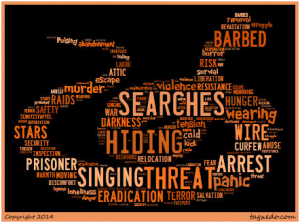 The fourteen true stories of survival in Hidden Like Anne Frank are emotionally charged and moving. Editors Marcel Prins and Peter Henk Steenhuis have collected incredible accounts of what it means to live in hiding, when a ticking clock can remind a survivor of the darkest days of his life.
The fourteen true stories of survival in Hidden Like Anne Frank are emotionally charged and moving. Editors Marcel Prins and Peter Henk Steenhuis have collected incredible accounts of what it means to live in hiding, when a ticking clock can remind a survivor of the darkest days of his life.
Storytellers not only reveal what it means to be Jewish, but what it means to be a survivor. They tell of the “years of tears” and the difficulty of loss—the loss of possessions, loved ones, family bonds of affection, and one’s very identity. At a time when people were persecuted for even looking Jewish, many of the Holocaust survivors had to change their names, deny their Jewishness, and go into hiding. Families were torn apart, and “everything about you can change, but the voices stay the same” (40). Michael Goldstein tells of his inability to recall emotions from “back then.” About emotions, he writes: “I just can’t reach them anymore. Maybe I’ve automatically kept the past at a distance because I had to hide away for so many years and deny my background. Or maybe it’s just that it’s impossible to relive those feelings from the past, and so I have to make do with memories” (173).
From the fourteen young protagonists—some only three when they went into hiding, others in their teens—readers learn about Jewish holidays like Shabbat and what it means to be kosher, to wear a keppel, to speak Hebrew, and to attend shul. We also learn history of events like Hunger Winter, Mad Tuesday, “Pulsings,” wearing stars, and how for some of these young people, “the war made [them] Jewish” (205).
While some remember the kindness of those who helped them hide, the hymns sung, or the feeling of security from a grandparent or aunt/uncle, others recall abuse, tension, and terror. After being separated for so long, some experienced difficulty in rebuilding family relationships; feelings of parental abandonment and the impact of new attachments inundated survivors. Others had to face the fact that family members had been murdered in a concentration or labor camp.
At a time when the Common Core Standards are calling for the reading of more nonfiction, this book not only engenders raw emotion but gives contemporary readers a poignant glimpse into a horrific historical time.
- Posted by Donna

